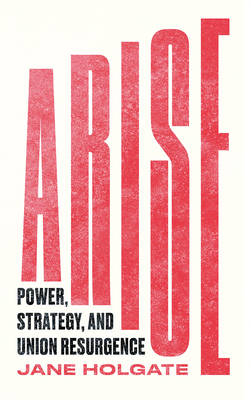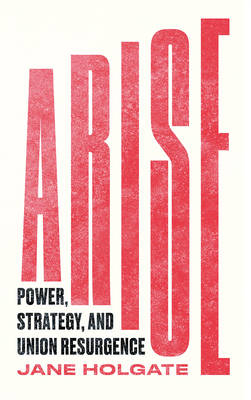
- Afhalen na 1 uur in een winkel met voorraad
- Gratis thuislevering in België vanaf € 30
- Ruim aanbod met 7 miljoen producten
- Afhalen na 1 uur in een winkel met voorraad
- Gratis thuislevering in België vanaf € 30
- Ruim aanbod met 7 miljoen producten
Zoeken
€ 156,45
+ 312 punten
Uitvoering
Omschrijving
'Jane Holgate is a brilliant thinker' - Jane McAlevey In Arise, Jane Holgate argues that unions must revisit their understanding of power in order to regain influence and confront capital. Drawing on two decades of research and organizing experience, Holgate examines the structural inertia of today's unions from a range of perspectives: from strategic choice, leadership and union democracy to politics, tactics and the agency afforded to rank-and-file members. In the midst of a neoliberal era of economic crisis and political upheaval, the labor movement stands at a crossroads. Union membership is on the rise, but the 'turn to organizing' has largely failed to translate into meaningful gains for workers. There is considerable discussion about the lack of collectivism among workers due to casualization, gig work and precarity, yet these conditions were standard in the UK when workers built the foundations of the 19th-century trade union movement. Drawing on history and case studies of unions developing and using power effectively, this book offers strategies for moving beyond the pessimism that prevails in much of today's union movement. By placing power analysis back at the heart of workers' struggle, Holgate shows us that transformational change is not only possible, but within reach.'Jane Holgate is a brilliant thinker' - Jane McAlevey In Arise, Jane Holgate argues that unions must revisit their understanding of power in order to regain influence and confront capital. Drawing on two decades of research and organising experience, Holgate examines the structural inertia of today's unions from a range of perspectives: from strategic choice, leadership and union democracy to politics, tactics and the agency afforded to rank-and-file members. In the midst of a neoliberal era of economic crisis and political upheaval, the labour movement stands at a crossroads. Union membership is on the rise, but the 'turn to organising' has largely failed to translate into meaningful gains for workers. There is considerable discussion about the lack of collectivism among workers due to casualisation, gig work and precarity, yet these conditions were standard in the UK when workers built the foundations of the 19th-century trade union movement. Drawing on history and case studies of unions developing and using power effectively, this book offers strategies for moving beyond the pessimism that prevails in much of today's union movement. By placing power analysis back at the heart of workers' struggle, Holgate shows us that transformational change is not only possible, but within reach.
Specificaties
Betrokkenen
- Auteur(s):
- Uitgeverij:
Inhoud
- Aantal bladzijden:
- 272
- Taal:
- Engels
- Reeks:
Eigenschappen
- Productcode (EAN):
- 9780745344034
- Verschijningsdatum:
- 20/08/2021
- Uitvoering:
- Hardcover
- Formaat:
- Genaaid
- Afmetingen:
- 140 mm x 216 mm
- Gewicht:
- 494 g

Alleen bij Standaard Boekhandel
+ 312 punten op je klantenkaart van Standaard Boekhandel
Beoordelingen
We publiceren alleen reviews die voldoen aan de voorwaarden voor reviews. Bekijk onze voorwaarden voor reviews.











